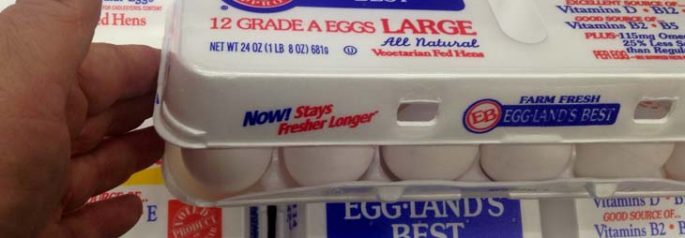
Dear John,
What do you think of omega-3 eggs? My local health food store sells “omega-3” eggs from hens who have been fed organically grown flaxseed and all natural, vegetarian feed. The egg carton says the eggs are certified organic and contain no growth hormones, medications, antibiotics or pesticides. I know that you have written extensively about the horrors of factory farm eggs, but what is your opinion of these eggs?
Harold
Dear Harold,
Omega-3 fatty acids are a critical part of the human diet, and there are many vegetarians and vegans whose diets would be improved by including more of them. But I don’t see any advantage in feeding flaxseed, which is very high in omega-3s, to hens and then eating their eggs. Why not just eat the flaxseed yourself?
Here is a recipe for a salad dressing that we use at our house that is extremely high in omega-3s and in the other essential fatty acids. We use it not just on salads, but on all kinds of foods, including rice and vegetable dishes.
Blend together very well:
6 ounces fresh squeezed lemon juice (preferably from Meyer lemons)
4 ounces flaxseed oil
4 ounces extra virgin olive oil
4 ounces shoyu (natural soy sauce)
1 large clove garlic
1/4 onion
4 T hulled hemp seed
Many consumers look to health food stores and “natural” brands for better eggs, hoping that if they buy eggs from a health food store, they will be assured of not eating the misery of factory farms. These stores frequently stock eggs labeled vegetarian, natural, hormone-free, organic, cage-free, and similar terms. Unless the label specifically says “cage-free,” however, it’s almost certain that the eggs come from caged birds.
Egglands Best and Vegetarian Harvest are two brands of eggs that are nationally available and are labeled “vegetarian.” But both of these brands come from caged hens. All the term vegetarian means in this case is that the birds were not fed meat. It means nothing about how they were housed or treated.
Similarly, advertisements for Happy Hen Organic Fertile Brown Eggs in Pennsylvania say that the hens run free “in a natural setting,” and are “humanely housed in healthy, open-sided housing, for daily sunning – something Happy Hens really enjoy.” In 2000, however, an article in Poultry Press revealed that more than 7,000 birds are housed in each Happy Hen barn; the wall-to-wall birds are severely debeaked; and individual hens have even less space than the abysmal industry standard.
How about the term “free range”? Allen Shainsky is the developer of “Rocky the Range Chicken,” the best-selling “free range” chicken in the Western United States. He comments, “Free range doesn’t mean anything… They’re just hoodwinking the public.”
Steve Bjerklie was the editor of Meat and Poultry magazine for fifteen years. His endorsement of so-called natural poultry products is also less than whole-hearted: “When it comes to the word… ‘free range’… federal law is and always was toothless. It doesn’t guarantee a thing… Poultry companies use ‘free range’ strictly as a marketing gimmick. Legally, the phrase means nothing. There is no law or regulation defining ‘free range.”
You mention that the eggs you are asking about are produced without added hormones. That sounds nice, but it means nothing. Tyson Foods, the world’s largest poultry producer, also brags in its ads that its products are “hormone free.” Hormone-free labels are meaningless when it comes to eggs and other U.S. poultry products because – although hormones are nearly universal in U.S. beef production – no hormones are currently approved for use in U.S. egg or poultry production.
If you are going to eat eggs, then it is certainly preferable to get them from hens who have been allowed a cage-free life, and fed organically. But it is important to remember that each such egg still contains about 1.5 grams of saturated fat and 215 milligrams of cholesterol. This is more – in a single egg – than two-thirds of the Daily Value for cholesterol. And many scientists believe the Daily Value for cholesterol has been set far higher than optimum for human health as a result of political pressure from the egg industry.
All the best,
John
Note: Image from Mike Mozart on Flickr under a Creative Commons license

